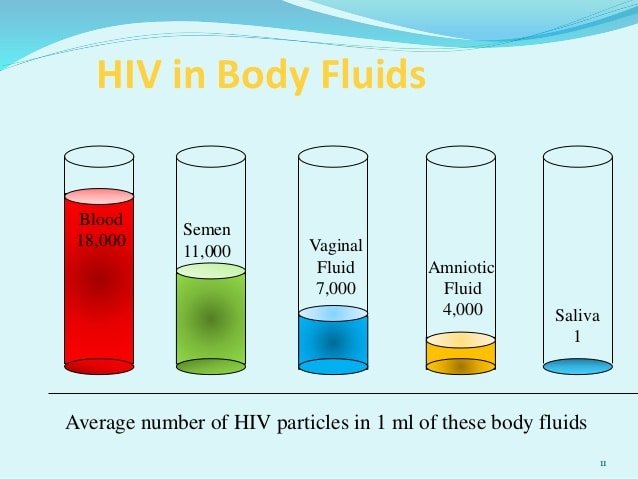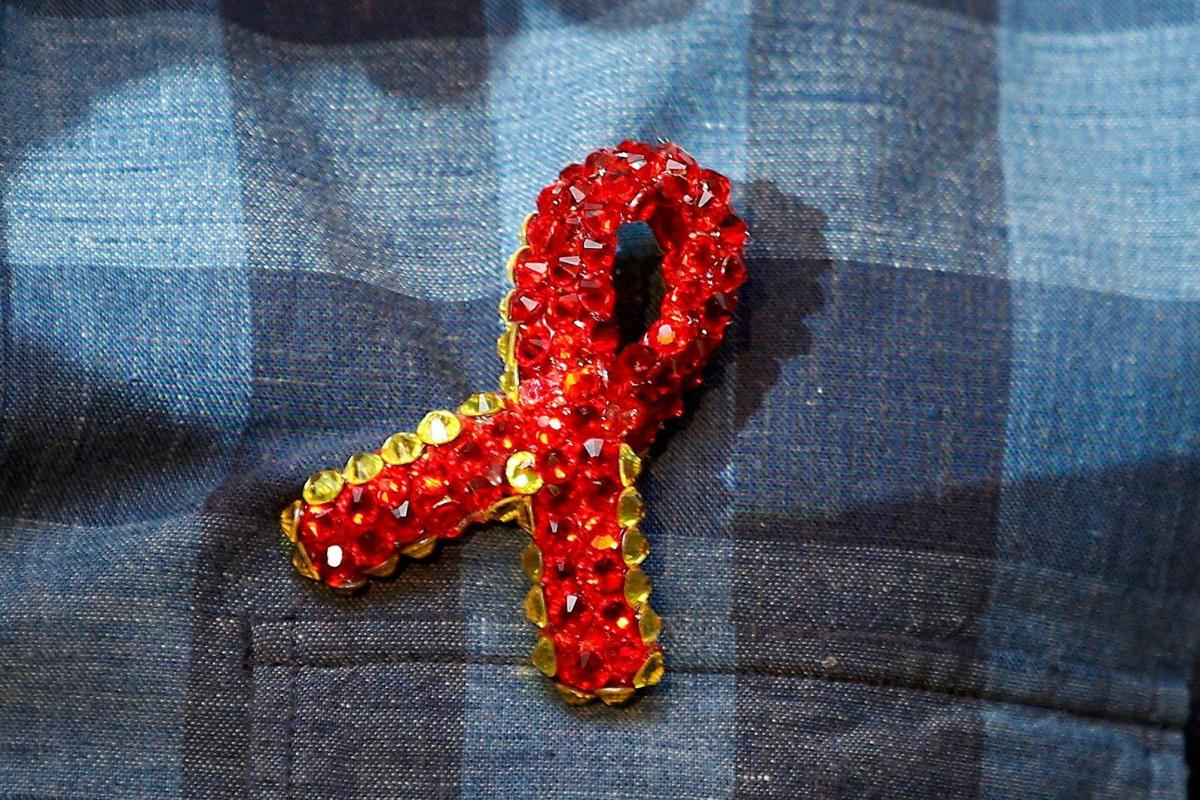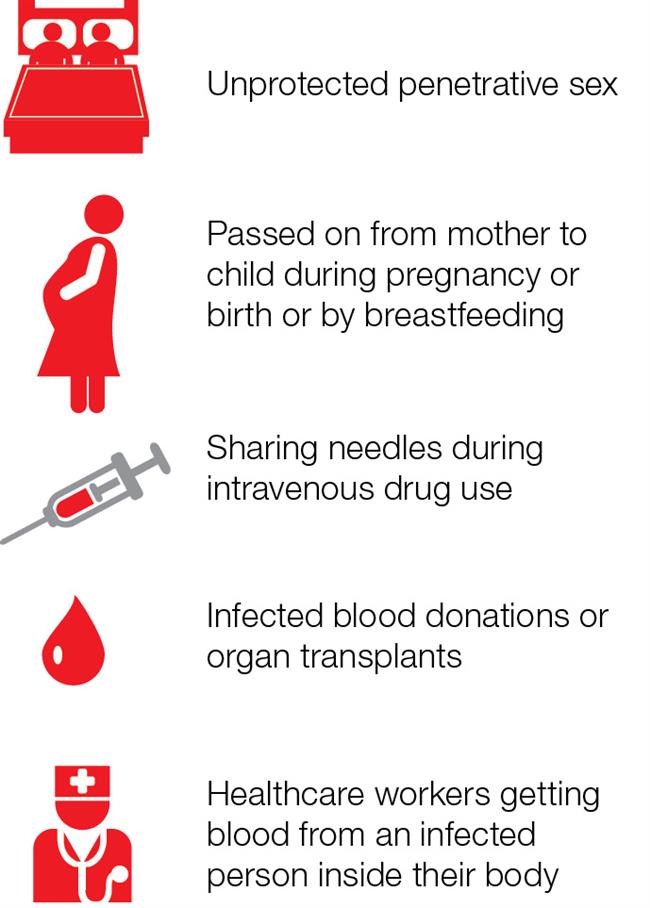Can You Get Hiv From Kissing
It is very unlikely to get HIV from kissing someone who has the virus.
HIV can only be found in saliva in trace amounts and the natural enzymes and antibodies in your saliva prevent the virus from infecting new cells.
“To get HIV, you need to have enough of the virus particulates in your bodily fluids. The highest amounts of the virus particulates live in blood, semen, and vaginal fluids. You have a few particles in the saliva but it’s not enough to infect you,” says Stella Safo, MD, an HIV primary care provider at Mount Sinai Health System, New York.
But Safo says that you should be wary of kissing someone with HIV if they have gaping mouth sores or cuts.
“The only way you could get HIV from kissing is if you had big cuts in your mouth and kissed someone with big cuts in their mouth, and there is an exchange of blood. However, that isn’t how a regular kissing experience typically goes,” Safo says.
Rare Ways Hiv Is Transmitted
Activities that seldom, but can, lead to HIV transmission include:
- oral sex
There are a number of methods that reduce the risk of contracting HIV:
- use condoms or other forms of barrier protection during sexual contact
- never sharing needles for injectable drugs or medications
- get tested regularly for HIV and other STIs
If a person is living with HIV, consider the above precautions and take additional measures. Following an antiretroviral medication regimen can reduce viral load and reduce the likelihood of transmission to others.
Another way to reduce the spread of HIV is by taking pre-exposure prophylactic medications. Also, post-exposure prophylaxis can be used to prevent HIV infection if someone is exposed to the virus.
How You Become Infected
There is HIV virus in body fluids like vaginal secretions and semen. If those fluids are present, they can enter the bloodstream of someone who doesn’t have HIV through an opening such as a mouth sore or a genital ulcer.
Your chances are higher of getting HIV if you:
- Have sores in your mouth, vagina, or penis
- Have another sexually transmitted disease
Also Check: Jania Has Herpes
How Is Hiv Spread
HIV is spread through the exchange of particular bodily fluids like semen, breast milk, and blood.
Important: The most common way HIV spreads is through sexual intercourse. According to the Center for Disease Control and Prevention, 138 people per 10,000 exposures are at risk of getting HIV through receptive anal sex.
Other common ways in which you can be infected with HIV include:
- Anal sex: Anal sex is the riskiest type of sex to have with a person who has HIV. It becomes even riskier if you are on the receiving end during intercourse. This is because the lining of the rectum is very thin, and can allow the virus to easily pass through.
- Penetrative vaginal sex: This is not as risky as anal sex, but is still a very common way for the virus to be spread. Here either party can contract the virus.
- Sharing needles and syringes: Sharing needles and syringes for steroids, drugs, or hormones with a person who has HIV puts you at high risk of getting the virus.
- Through pregnancy and breastfeeding: HIV can sometimes be passed from a mother to her baby through pregnancy and breastfeeding. This is known as perinatal transmission. It’s uncommon for this to occur if the mother is aware of her status and is receiving adequate treatment.
HIV can also be spread in other ways. However, these are rarer:
Can I Become Infected With Hiv If I Inject Drugs And Share The Needles With Someone Else Without Sterilizing The Needles

We strongly recommend that you use new equipment every time you inject. You can get new equipment from Counterpoint Needle & Syringe Program at Regional HIV/AIDS Connection.
There is a possibility of becoming infected with HIV if you share injecting equipment with someone who has the virus. If HIV infected blood remains inside the needle or in the syringe and someone else then uses it to inject themselves, that blood can be flushed into the bloodstream. Sharing needles, syringes, spoons, filters or water can pass on the virus. Disinfecting equipment between uses can reduce the likelihood of transmission, but does not eliminate it.
Also Check: Nba Youngboy Truth About Herpes
Tattoos And Body Piercings
- There are no known cases in the United States of anyone getting HIV this way.
- However, it is possible to get HIV from tattooing or body piercing if the equipment used for these procedures has someone elses blood in it or if the ink is shared. This is more likely to happen when the person doing the procedure is unlicensed because of the potential for unsanitary practices such as sharing needles or ink.
- If you get a tattoo or a body piercing, be sure that the person doing the procedure is properly licensed and that they use only new or sterilized needles, ink, and other supplies.
How Hiv Is Spread
The most common way that HIV is spread is through sexual intercourse, including oral and anal sex.
The virus can also be spread through sharing needles, and it can be passed from an infected pregnant woman to her unborn baby.
But steps can be taken to reduce the likelihood of HIV being passed on to a baby, making transmission in this way rare in the UK.
For example, the risk of transmission can be reduced by:
- giving antiretroviral medicine to a mother and her newborn baby
- giving birth by caesarean section
- not breastfeeding
You cannot catch HIV from:
- kissing
- giving mouth-to-mouth resuscitation
- being sneezed on by someone with HIV
- sharing baths, towels or cutlery with someone with HIV
- swimming in a pool that’s been used by someone with HIV
- sitting on a toilet seat that someone with HIV has sat on
You May Like: Do Youngboy Have Herpes
How Is Hiv Spread From Person To Person
HIV can only be spread through specific activities. In the United States, the most common ways are:
- Having vaginal or anal sex with someone who has HIV without using a condom or taking medicines to prevent or treat HIV. Anal sex is riskier than vaginal sex.
- Sharing injection drug equipment , such as needles, with someone who has HIV.
Less common ways are:
- From mother to child during pregnancy, birth, or breastfeeding. However, the use of HIV medicines and other strategies have helped lower the risk of mother-to-child transmission of HIV to 1% or less in the United States.
- Getting stuck with an HIV-contaminated needle or other sharp object. This is a risk mainly for health care workers. The risk is very low.
HIV is spread only in extremely rare cases by:
- Having oral sex. But in general, the chance that an HIV-negative person will get HIV from oral sex with an HIV-positive partner is extremely low.
Can You Get Hiv Through Oral Sex
The risk of HIV from oral sex is very small unless you or your partner have large open sores on the genital area or bleeding gums/sores in your mouth.
There is only a slightly increased risk if a woman being given oral sex is HIV-positive and is menstruating. However, you can always use a dental dam to eliminate these risks.
You May Like: How Long Does Hiv
How Do You Get Hepatitis B
Hepatitis B is really contagious. Its transmitted through contact with semen , vaginal fluids, and blood. You can get it from:
-
having vaginal, anal, or oral sex
-
sharing toothbrushes and razors
-
sharing needles for shooting drugs, piercings, tattoos, etc.
-
getting stuck with a needle that has the Hep B virus on it.
Hepatitis B can also be passed to babies during birth if their mother has it.
Hepatitis B isnt spread through saliva , so you CANT get hepatitis B from sharing food or drinks or using the same fork or spoon. Hepatitis B is also not spread through kissing, hugging, holding hands, coughing, sneezing, or breastfeeding.
Ways Hiv Is Not Spread
Get the true facts about HIV transmission.
Thinkstock
The human immunodeficiency virus, or HIV, has existed in the United States since at least the 1970s, but myths and misconceptions about how it’s transmitted still persist.
Most people know that the virus is commonly spread through sexual contact and intravenous drug use. But what other behaviors are and are not risk factors?
You May Like: Atlanta Hiv Rate 2017
Stds From Toilet Seats
Germs in restrooms may concern you. So, you may want to learn about the viruses, bacteria, and parasites that can survive on bathroom surfaces and identify ways you can avoid taking those germs with you.
When wondering what diseases you can catch in restrooms, sexually transmitted infections also called sexually transmitted diseases may be one of your greatest concerns.
STDs mainly transmit through vaginal, anal, and oral sex, and sometimes, during activities like:
Most STDs dont transmit through:
- Restroom toilet seats
But there may be some that you may need to be careful about.
Bacterial STDs
These diseases include chlamydia, gonorrhea, and syphilis. Bacteria that cause STDs live in the mucous membranes around your penis, vagina, anus, and mouth. But they cant survive for long outside the mucous membranes.
Viral STDs
If an STD is viral, it can spread outside the mucus membranes and to other skin cells. The viruses that cause STDs dont spread far but can survive on porous skin near your mucous membranes. Viral STDs include:
Parasitic STDs
Some STDs are caused by live parasites like trichomoniasis and pubic lice also called crabs. Parasitic STDs can happen on surfaces including:
- Toilet seats
- Bedsheets
- Blankets
Exceptions to the rule
You are not likely to catch a viral or bacterial disease on a toilet seat. Physical contact has to be back-to-back for you to contract a bacterial or viral infection from a toilet seat.
Its Easy To Tell The Symptoms Of Hiv

The symptoms of HIV can differ from person-to-person and some people may not get any symptoms at all. Without treatment, the virus will get worse over time and damage your immune system over time. There are three stages of HIV infection with different possible effects.
Also, you also cant tell by looking at someone whether they have HIV or not. Many people don’t show signs of any symptoms. And, for people living with HIV who are on effective treatment, they are just as likely to be as healthy as everyone else.
Read Also: Is Undetectable Hiv Contagious
How Hiv Is Transmitted
HIV is not passed on easily from one person to another. The virus does not spread through the air like cold and flu viruses.
HIV lives in the blood and in some body fluids. To get HIV, 1 of these fluids from someone with HIV has to get into your blood.
The body fluids that contain enough HIV to infect someone are:
- semen
- vaginal fluids, including menstrual blood
- breast milk
- contact with animals or insects like mosquitoes
As Of 2011 23 Million People Were Hiv Positive In India Here Are 11 Things You Didn’t Know About The Disease
Written by Pavitra Sampath | Updated : February 4, 2015 7:08 PM IST
According to NACO report of 2011, 2.3 million people were HIV positive in India and were most prevalent in Andhra Pradesh and Manipur having the highest number of cases. HIV was more prevalent in men than in women and was seen in people between 15-49 years of age. Although the number of HIV cases has decreased by 50% in 2011, most people lack awareness about the condition. To help you out in this regards, here are eleven things about HIV/AIDS you ought to know.
Fact 1: A person may be HIV positive but might not necessarily have AIDS
HIV stands for Human Immunodeficiency Virus. A person is termed to be HIV positive when they are found to be infected by this virus. As the disease progresses it eventually eats away at the immune system of the patient, causing a number of opportunistic infections to take hold along the way. AIDS or Acquired Immunodeficiency Disease is a host of conditions that are associated with the loss of one s immune system according to the CDC when a person s CD4 count is below 200 cells/mm3. This is the most severe stage of the infection. HIV and AIDS are different and a person who is HIV positive does not necessarily have AIDS. Here are real life stories of 5 people who didn t know they had HIV.
Read Also: Does Aids Make Your Hair Fall Out
Is There A Risk Of Hiv Transmission When Getting A Tattoo Or A Body Piercing Or While Visiting The Barber Or Hairdresser
Persons who carry out body-piercing and tattoos should follow procedures called “Universal Precautions“, which are designed to protect both workers and their customers from the transmission of blood borne infections such as HIV and Hepatitis B. The guidelines state that any instrument designed to penetrate the skin such as tattoo or acupuncture needles should be either used only once and discarded , or should be thoroughly cleaned and sterilized after each use.
When visiting the barber there is no risk of infection unless the skin is cut and if there is a transfer of infected blood. If the instruments are contaminated with infected blood and are not sterilized between clients there is a risk of HIV transmission.
Can The Virus Be Transmitted Through Breastfeeding
Yes, HIV is present in infectious amounts in breast milk. HIV can be passed from an HIV infected mother to her baby through breastfeeding. Most HIV+ children in the Caribbean have been infected through mother-to-child transmission of HIV.
This can be prevented when an HIV infected mother does not breastfeed her baby and uses other alternate milk recommended by her doctor. More information on HIV and pregnancy can be found here.
Read Also: What Does Antiretroviral Therapy Do Brainly
Can You Get Hiv From A Mosquito Bite
From the very start of the HIV epidemic, there have been concerns about the transmission of HIV through biting and bloodsucking insects, such as mosquitoes. It was a natural concern given that many diseases, such as malaria and Zika fever, are readily transmitted through an insect bite.
However, this is not the case with HIV. Epidemiological studies conducted by the Centers for Disease Control and Prevention in Atlanta have shown no evidence of HIV transmission through mosquitoes or any other insects, even in countries with extremely high rates of HIV and uncontrolled mosquito infestations. The lack of such outbreaks supports the conclusion that HIV cannot be transmitted by the insects.
How To Prevent Hepatitis B
Hepatitis B is a liver infection caused by a virus . It can be serious and theres no cure, but the good news is its easy to prevent. You can protect yourself by getting the hepatitis B vaccine and having safer sex. If you have oral, anal, and vaginal sex, use condoms and dental dams to help stop the spread of hepatitis B and other STDs.
Don’t Miss: Hiv Without Ejaculation
Isnt Hiv Only A Risk For Certain Groups Of People
Like most illnesses, HIV doesnt discriminate between types of people and the infection can be passed on to anyone via one of the ways mentioned above.
Some people are more vulnerable to HIV infection if they engage regularly in certain activities that are more likely to transmit the virus. However, its a common misunderstanding that HIV only affects certain groups.
While not everyone has the same level of HIV risk, everyone can reduce their risk of infection.
How Does Hiv Spread

HIV spreads when infected blood, semen or vaginal fluids enter the body. Because symptoms can be mild at first, people with HIV might not know they’re infected. They can spread HIV to others without knowing it.
HIV can spread:
- during sex
- through sharing needles for injecting drugs or tattooing
HIV also can pass from mother to child during pregnancy, childbirth, or breastfeeding.
HIV does not spread through:
- pee, poop, spit, throw-up, or sweat
- coughing or sneezing
- sharing eating utensils or drinking glasses
You May Like: Does Cookie Johnson Have Aids
Is Unprotected Anal Intercourse More Of An Hiv Risk Than Vaginal Or Oral Sex
Unprotected anal intercourse does carry a higher risk than most other forms of sexual activity. The lining of the rectum has fewer cells than that of the vagina, and therefore can be damaged more easily, causing bleeding during intercourse. This can then be a route into the bloodstream for infected sexual fluids or blood. There is also a risk to the insertive partner during anal intercourse, though this is lower than the risk to the receptive partner.
Myths About Hiv And Aids
FAST FACTS:
- There are lots of myths around, but the facts of how you can get HIV, and how you can protect yourself, are very simple.
- One of the most common myths people living with HIV hear is that they can be cured. Theres no cure yet for HIV, but antiretroviral treatment works and will keep someone living with HIV healthy.
There are lots of myths and misconceptions about how you can get HIV. Here we debunk those myths and give you the facts about how HIV is passed on
HIV can only be passed on from one person to another via the following bodily fluids:
- blood
Read Also: Does Cookie Have Hiv